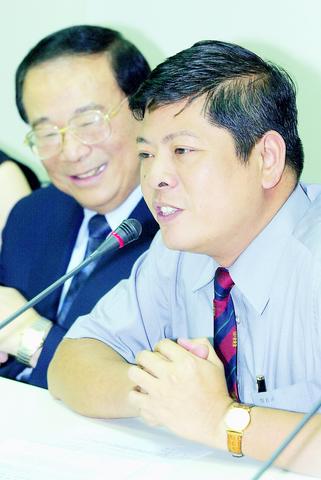After aligning himself with the DPP legislative caucus last session, independent Legislator Eugene Jao (趙永清) has become a dues-paying member of the ruling party.
The move, though unsurprising, injects an extra dose of euphoria into the party, which has won a number of crucial votes in the legislature despite its lack of a majority.

PHOTO: CHIANG YING-YING, TAIPEI TIMES
Dubbed a "sunny boy," Jao said he was attracted to the party's commitment to the principles of democracy and justice.
"It is my firm belief that justice should take precedence over partisan concerns, as no mortal can outlive the system," he told a news conference yesterday, flanked by well-wishers including incoming DPP secretary-general Chang Chun-hsung (
The four-term lawmaker, known for his staunch anti-nuclear stance, urged the DPP government to strive to make Taiwan nuclear-free and to push for referendum and anti-corruption laws.
"Let's give equal emphasis to economic development and environmental protection," said Jao, who broke ranks with the KMT last year over its energy policy. "Only then, can the inhabitants of this land enjoy a safe life."
In a sign of the warmth of the DPP's welcome, Chang said that the KMT would still be in in power if it had more members like Jao. "If that were the case, there would have been no need for the DPP to exist in the first place," he added.
Jao, 45, has been representing Taipei County for the past decade. His father and brother were former members of the National Assembly and now-defunct Provincial Assembly under the KMT banner.
In Oct 2000, the KMT suspended Jao's party membership after he joined with anti-nuclear groups in opposing construction of the partially built Fourth Nuclear Power Plant.
The following January, the KMT revoked his membership after he formed the People's Union (
Incensed by the plant's revival, Jao launched a signature drive in a bid to oust then-premier Chang and pressured the Cabinet to call a popular vote on the fate of the project.
Neither Jao nor Chang made any mention of the episode yesterday.
Calling himself a supporter of the middle-road policy trumpeted by President Chen Shui-bian (
"Political stability will be more attainable if the country has only two parties," he said.
Indeed, Chen and Premier Yu Shyi-kun both signed the column of reference in Jao's application form.
The frank-speaking lawmaker, however, did not hide his reservations about the pro-independence clause enshrined in the DPP charter.
He suggested the party adopt more pragmatism when dealing with cross-strait affairs, noting that relations between Taiwan and China have undergone substantial change over the years.
"It is time the DPP platform, drafted when the party was in opposition, be amended to stay in tune with reality," Jao said.
Also, he confessed he is not fully at ease with factional wrangling inside the party and has no intention of joining any faction for now.
"For better or worse, at least the DPP allows its members to make known their opinions during the decision-making process, a practice that is unimaginable in the KMT," Jao said.
While a KMT member, Jao belonged to the Reformist faction where he and colleagues such as Apollo Chen (陳學聖) and Chu Li-luan (朱立倫) sought to revitalize the party -- but to no avail.
"In the end, I was expelled from the party myself," he said, adding that more will follow when the time is right.
Apollo Chen, for instance, has often complained about "being lonely," he said.

Alain Robert, known as the "French Spider-Man," praised Alex Honnold as exceptionally well-prepared after the US climber completed a free solo ascent of Taipei 101 yesterday. Robert said Honnold's ascent of the 508m-tall skyscraper in just more than one-and-a-half hours without using safety ropes or equipment was a remarkable achievement. "This is my life," he said in an interview conducted in French, adding that he liked the feeling of being "on the edge of danger." The 63-year-old Frenchman climbed Taipei 101 using ropes in December 2004, taking about four hours to reach the top. On a one-to-10 scale of difficulty, Robert said Taipei 101

Nipah virus infection is to be officially listed as a category 5 notifiable infectious disease in Taiwan in March, while clinical treatment guidelines are being formulated, the Centers for Disease Control (CDC) said yesterday. With Nipah infections being reported in other countries and considering its relatively high fatality rate, the centers on Jan. 16 announced that it would be listed as a notifiable infectious disease to bolster the nation’s systematic early warning system and increase public awareness, the CDC said. Bangladesh reported four fatal cases last year in separate districts, with three linked to raw date palm sap consumption, CDC Epidemic Intelligence

US climber Alex Honnold left Taiwan this morning a day after completing a free-solo ascent of Taipei 101, a feat that drew cheers from onlookers and gained widespread international attention. Honnold yesterday scaled the 101-story skyscraper without a rope or safety harness. The climb — the highest urban free-solo ascent ever attempted — took just more than 90 minutes and was streamed live on Netflix. It was covered by major international news outlets including CNN, the New York Times, the Guardian and the Wall Street Journal. As Honnold prepared to leave Taiwan today, he attracted a crowd when he and his wife, Sanni,

Taiwanese and US defense groups are collaborating to introduce deployable, semi-autonomous manufacturing systems for drones and components in a boost to the nation’s supply chain resilience. Taiwan’s G-Tech Optroelectronics Corp subsidiary GTOC and the US’ Aerkomm Inc on Friday announced an agreement with fellow US-based Firestorm Lab to adopt the latter’s xCell, a technology featuring 3D printers fitted in 6.1m container units. The systems enable aerial platforms and parts to be produced in high volumes from dispersed nodes capable of rapid redeployment, to minimize the risk of enemy strikes and to meet field requirements, they said. Firestorm chief technology officer Ian Muceus said